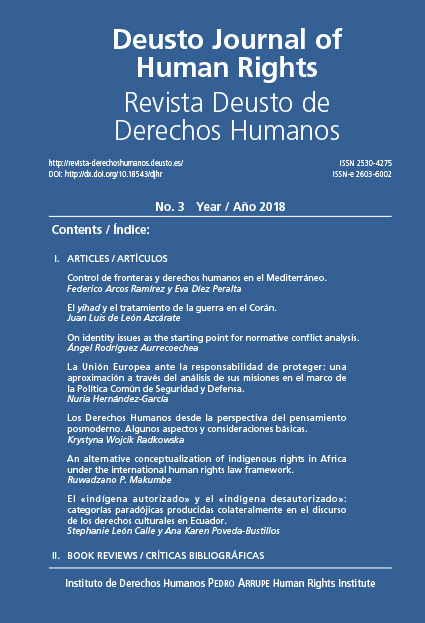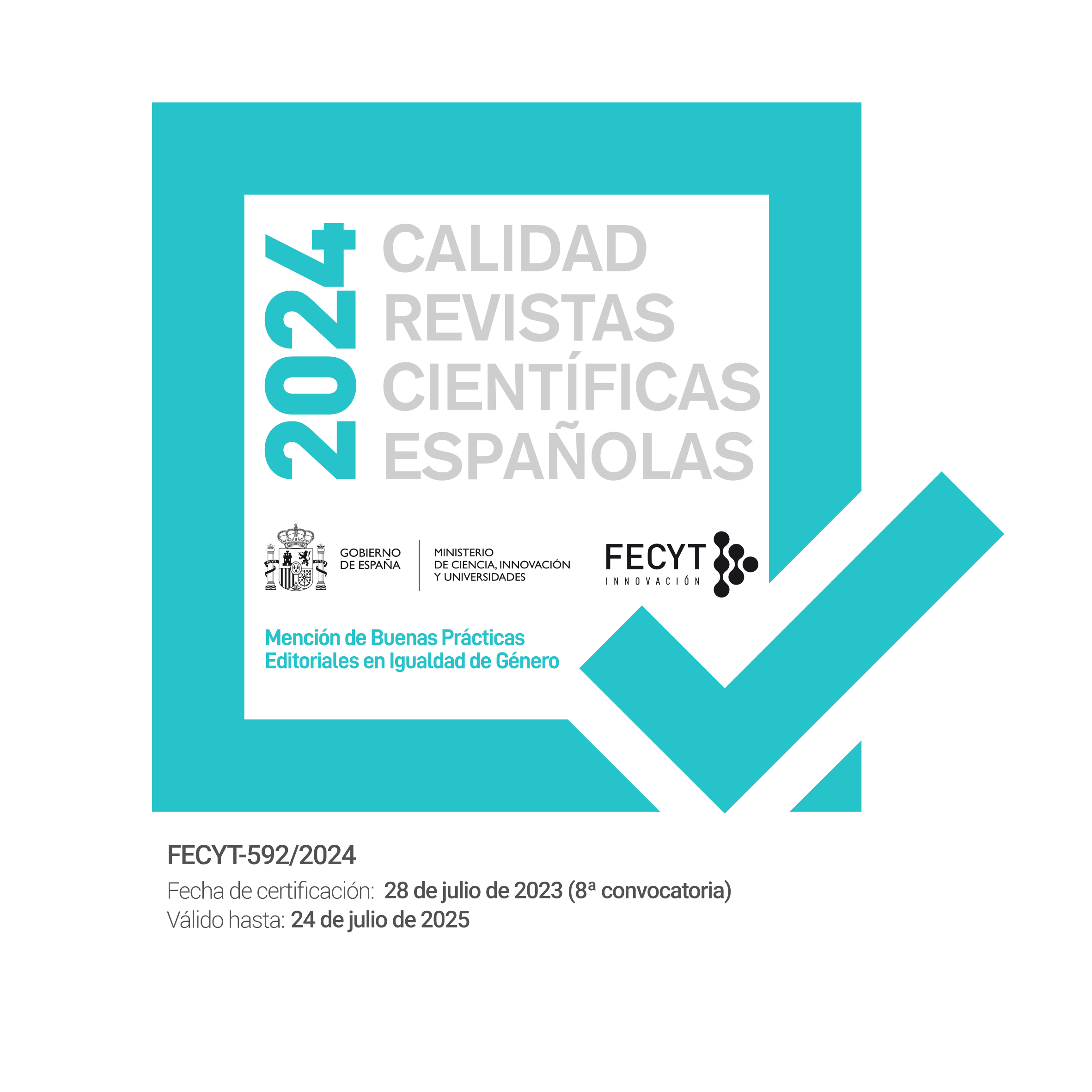Una conceptualización alternativa de los derechos indígenas en África en el marco del derecho internacional de los derechos humanos
Resumen
Este artículo es una aclaración basada en la práctica de cómo los derechos de los indígenas, según lo establecido en el derecho internacional de los derechos humanos, pueden protegerse e implementarse de manera segura en el discurso más amplio de los derechos humanos. El concepto de indigenismo se impugna en muchos países africanos y la pregunta principal es: ¿quién es indígena? Las “políticas de reconocimiento” han paralizado el trabajo del movimiento de derechos indígenas africanos hasta el momento y este documento se basa en el discurso sobre los derechos indígenas, haciendo una propuesta hacia una maquinaria efectiva para facilitar su protección. Por lo tanto, el enfoque es construir una perspectiva diferente que enfatice la necesidad de utilizar, desarrollar y mejorar la maquinaria existente de derechos humanos. Esto se hace a través de la reconceptualización de los derechos indígenas en África a través de la utilización de la maquinaria de protección etno-cultural. En la última parte de este artículo, veo a los pueblos San en Zimbabwe como un estudio de caso representativo para poner en perspectiva las realidades vividas de los pueblos indígenas en África.
Recibido: 28 junio 2018
Aceptado: 23 octubre 2018
Publicación en línea: 11 diciembre 2018
Descargas
Citas
African Commission on Human and Peoples Rights. 2000. “51: Resolution on the Rights of Indigenous Peoples’ Communities in Africa”. African Union on Human and Peoples Rights. October. Accessed March 1, 2018. http://www.achpr.org/sessions/28th/resolutions/51.
African Commission’s Working Group Of Experts on Indigenous Populations/Communties. 2005. Report of the African Commission’s Working Group of Experts on Indigenous Populations/Communities. African Commission on Human and Peoples Rights, Banjul, The Gambia: African Commission on Human and Peoples Rights, 119.
Barnard, Alan. 1992. Hunters and herders of Southern Africa: A comparative ethnography of the Khoisan peoples, Cambridge: Cambridge University Press.
Barume, Albert K. 2009. “Responding to the concerns of the African States”. Making the Declaration Work: The United Nations Declaration on the Rights of Indigenous Peoples. 170-183.
Battiste, Marie. 2002. “Decolonising University Research: Ethical Guidelines for Research Involving indigenous Populations”. In Justice Pending: Indigenous Peoples and Other Good Causes, edited by Gudmundur Alfredsson and Maria Stavropoulou, 33-44. The Hague: Kluwer Law International.
Bojosi, Kealeboga, N. 2010. “The African commission working group of experts on the rights of indigenous communities/populations: some reflection on its work so far”. In Perspectives on the rights of minorities and indigenous peoples in Africa, edited by Solomon Dersso, 95-140. Cape Town: Pretoria University Law Press.
Cobo, Martinez, R, Jose. 1985. Study on the Problem of Discrimination Against Indigenous Populations Final Report. United Nations, Special Rapporteur of the Sub-Commission on Prevention of Discrimination and Protection of Minorities, United Nations.
Coltart, David. 2018. “After Mugabe: Mnangangwa’s choice”, Policy: A Journal of Public Policy and Ideas, 34(1): 51-54.
Cultural Survival. 2016. Observations on the State of Indigenous Human Rights in Zimbabwe Prepared for United Nations Human Rights Council: 2nd cycle of Universal Periodic Review of Zimbabwe 26th session of the Human Rights Council. Cambridge, MA: Cultural Survival, 1-8.
Daes, Erica. 2001. “Indigenous peoples and their relationship to land: Final working paper prepared by the Special Rapporteur”, UNHCR.
Dersso, A, Solomon. 2010. “The Socio-historical and Political Processes leading to the Emergence and development of norms on minorities”. In Perspectives on the rights of minorities and indigenous peoples in Africa, edited by A, Solomon Dersso, 43-72. Cape Town: Pretoria University Law Press.
Eide, Asbjorn, and Irene, Erika Daes. 19 July 2000. Prevention of discrimination against and the protection of minorities: Working paper on the relationship and distinction between the rights of persons belonging to minorities and those of indigenous peoples. Commision on Human Rights. Sub-Commission on the Promotion and Protection of Human Rights, United Nations, Economic and Social Council, United Nations, Economic and Social council, 11.
European powers. 1648. “The Peace of Westphalia”, Osnabrück and Münster, Germany.
Freeman, Michael. 2011. Human Rights. 2. Cambridge: Polity Press.
Gaventa, John. 2006. “Finding the Spaces for Change: A Power Analysis”. Institute of Development Studies Bulletin, 37(6): 23-33.
Hays, Jennifer. 2009. “Learning Indigenous Knowledge Systems” 194-207.
Hays, Jennifer, and Megan Biesele. 2011. “Indigenous Rights in Southern Africa: International mechanisms and local contexts”, The International Journal of Human Rights, 15(1): 1-10.
Hitchcock, Robert K, and Ben, Murwira, Ashton Begbie-Clench. 2016. The san in Zimbabwe. Livelihoods, Land and Human Rights. IWGIA Report 22, Copenhagen: IWGIA-OSISA-University of Zinbabwe, 69.
Hitchcock, Robert, Ben Begbie-Clench, Ignatious Mberengwa, and Davy Ndlovu. 2017. “Zimbabwe”. Edited by Wiben, Marianne Jensen. Indigenous World (International Work Group for Indigenous Affairs (IWGIA)) 534-539.
Hodgson, Louise, Dorothy. 2009. “Becoming Indigenous in Africa”, African Studies Review, 1-32.
International Labour Organisation. 2009. A Guide to ILO Convention No. 169. International Labour Standards Department, Indigenous and Tribal Peopls’ Rights in Practice, ILO, 201.
International Working Group on Indigenous Affairs. 2016. “Report on Zimbabwe-Indigenous World”.
Internet Archive. 2011. The literature and culture of Zimbabwe. Accessed May 16, 2018. https://web.archive.org/web/20070712141810/ http://www.scholars.nus.edu.sg/post/zimbabwe/zpeople.html .
Kenrick, Justin, and Jerome Lewis. 2004. “Discussion: On the Return of the Native”, Current Anthropology 45(2): 263.
Kipuri, Naomi. 2005. “The Working Group of the African Commission on Human and Peoples’ Rights on the situation of indigenous Populations and Communities in Africa”, IFAD Governing Council Metting. Rome: United Nations.
Kuper, Adam. 2003. “The Return of the Native”, Current Anthropology, 44(3): 389-402.
Malloy, H, Tove. 2006. “Towards a New Paradigm of Minority Law-Making: A Rejoinder to Palermo and Woelk’s Law of Diversity”, European Yearbook of Minority Issues (Koninklike Brill NV) 4: 5-28.
Musamba, C. 2015. “Cultural Diversity and Democratic Global Cooperation: A perspective from Africa”, Global Dialogues.
Nabudere, Wadada, Dani. 2005. “Human Rights and Cultural Diversity in Africa”, Conference on The Fusion of Legal Systems and Concepts in Africa. Entebbe: Association of Law Reform Agencies of eastern and Southern Africa (ALRAESA). 8.
Parliament of Zimbabwe. 2017. “Constitution of Zimbabwe (Ammendment No. 20)”, Constitute Project. November 23. Accessed March 12, 2018. https://www.constituteproject.org/constitution/Zimbabwe_2013.pdf.
Pelican, Michaela. 2009. “Complexities of indigeneity and autochtony: An African Example”, American Ethnologist, 36(1): 52-65.
Pentassuglia, Gaetano. 2017. “Introduction: The Unpacking of Ethno-Cultural Diversity”. In Ethno-Cultural Diversity and Human Rights Challenges and Critiques, edited by Gaetano Pentassuglia, 1-24. Leiden: Brill | Nijhoff.
Pheage, Tefo. 25 May 2015. “Mugabe, Basarwe clash over civilization diatribe”. Available online at, http://www.weekendpost.co.bw/wp-news-details.php?nid=1054, Weekend Post, 1.
Quane, Helen. 2005. “The Rights of Indigenous Peoples and the Development Process”, Human Rights Quarterly, 27: 652-682.
Raz, Joseph. 1988. The Morality of Freedom. Oxford: Oxford University Press.
Reference Re Secession of Quebec. 1998. [1998] 2 S.C.R.217 (Supreme Court of Canada, Supreme Court of Canada Judgments August 20).
Robins, Steven. 2003. “A comment to Adam Kuper’s «The Retirn of the Native»”, Current Antropology 44(3): 398-399.
Ruiz Vieytez, Eduardo. 2014. “Cultural Diversities and Human Rights: History, Minorities, Pluralization”, The Age of Human Rights Journal 3: 1-31.
Suzman, James. 2003. “A comment to Adam Kuper’s «The Return of the Native»”, Current Anthropology 44(3): 399-400.
Sylvain, Renee. 2017. “Indigenous Peoples in Africa”. Oxford Research Encyclopedia of African History (Oxford University Press USA) 31.
Szpak, Agnieszka. 2017. “Human Security of the Indigenous Peoples in the Arctic. The Sami Case”, Interdisciplinary Political and Cultural Journal 20(1): 75-96.
The African Commission on Human and Peoples’ Rights at its 28th ordinary session. 2005. Report of the African Commission’s Working Group of Experts on Indigenous Populations/Communities. Working Group on Indigenous Populations/Communities, ACHPR , ACHPR, 119.
Ughi, Cristina. 2012. “The «Right to Development» of Indigenous Peoples: A Critical Approach Through a Comparative Study of Cases Brought Before the Inter-American Court of Human Rights and the African Commission on Human and Peoples’ Rights”. The BSIS Journal of International Studies (Brussels School of International Studies at the University of Kent) 9: 1-27.
UNESCO General Conference . 2005. UNESCO Convention on the Protection and Promotion of the Diversity of Cultural Expressions. Paris, October 3-21.
UNESCO. 2001. Universal Declaration on Cutural Diversity. Paris: UNESCO.
United Nations General Assembly. 1948. Universal Declaration of Human Rights. Paris: www.un.org.
United to End Genocide. n.d. The Rwandan Genocide. Accessed May 10, 2018. http://endgenocide.org/learn/past-genocides/the-rwandan-genocide/.
Venkatasawmy, Rama. 2015. “Ethnic Conflict in Africa: A Short Critical Discussion”, Transcience 6 (2): 26-37.
Viljoen, Franz. 2010. “Reflection on the Legal Protection of Indigenous Peoples’ Rights in Africa”. In Perspectives on the rights of minorities and indigenous peoples in Africa, edited by Solomon Dersso, 75-93. Cape Town: Pretoria University Law Press (PULP).
Webb, Jill. 2012. “Indigeous Peoples and the right to self-determination”, Journal of Indigenous Policy 75(13): 75-102.
World Conference on Human Rights. 1993. “Vienna Declaration and Programme of Action”. Vienna.
Yacoub, Joseph. 2010. “Cultural diversity and international law. In the field of human rights and identities”, Revue internationale: International Webjournal (Sens Public) 1-12.
Deusto Journal of Human Rights / Revista Deusto de Derechos Humanos es una revista de Acceso Abierto; lo que significa que es de libre acceso en su integridad inmediatamente después de la publicación de cada número. Se permite su lectura, la búsqueda, descarga, distribución y reutilización en cualquier tipo de soporte sólo para fines no comerciales y según lo previsto por la ley; sin la previa autorización de la Editorial (Universidad de Deusto) o la persona autora, siempre que la obra original sea debidamente citada (número, año, páginas y DOI si procede) y cualquier cambio en el original esté claramente indicado. Cualquier otro uso de su contenido en cualquier medio o formato, ahora conocido o desarrollado en el futuro, requiere el permiso previo por escrito de la persona titular de los derechos de autoría.



3.jpg)
3.jpg)
3.jpg)
.jpg)








